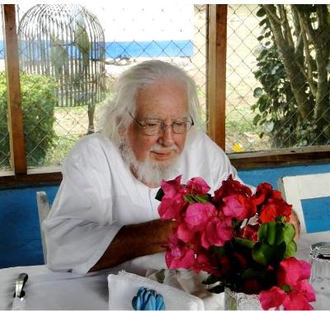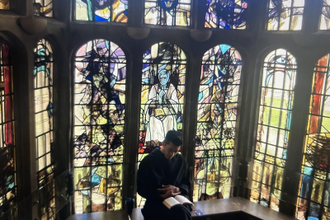Fr Ernesto Cardenal, revolutionary Nicaraguan priest, dies at 95

Ernesto Cardenal, the radical Latin American priest, poet and revolutionary has died. He was famous for defying the Catholic Church in the 1980s by serving in the revolutionary Sandinista government of Nicaragua. His suspension from the priesthood by St John Paul II lasted over three decades.
Known for his trademark black beret and loose white peasant shirts, the author of works such as 'Epigrams' and 'Zero Hour' was one of the most important and honoured poets in Nicaraguan history. He was hospitalised in Nicaragua's capital of Managua a couple of days ago with respiratory and heart problems. The Vatican's ambassador to Nicaragua visited him at the hospital and joined him in celebrating Mass, a moment that Cardenal's personal assistant described as "very moving" and said it made him "very happy".
Clare Dixon of CAFOD said: "Nicaragua is a nation of poets and artists, and none come greater than Fr Ernesto Cardenal, Trappist monk, mystic and revolutionary. He was a worthy successor to the national hero, Ruben Dario, one of the greatest poets in the Spanish language. Whether Minister of Culture during the first Sandinista government in the 1980s, or strong critic of the Sandinista leadership since 1994, Padre Ernesto never wavered in his passion for social justice, for his life among the artisans of his community in the Solentiname islands."
Julian Filochowski chair of the Romero Trust met Fr Ernesto during his time as director of CAFOD. Julian said: "I admired him hugely. He was one of the world's greatest poets."
Born in 1925 to a wealthy family, Fr Cardenal became a prominent intellectual voice of the Nicaraguan revolution and an ardent proponent of Liberation Theology, a Christian movement committed to social justice. On the Solentiname Islands in Lake Nicaragua, he founded a community of peasants, poets and painters in 1966 that came to symbolise artistic opposition to the dictatorship of Anastasio Somoza, who was overthrown in 1979 by Sandinista rebels.
Cardenal actively supported the revolution and served as culture minister during the first government of former Sandinista guerrilla Daniel Ortega - causing him to have a run in with the then-Pope John Paul II, now St John Paul, who firmly held that clerics should not hold political office. The pontiff was also wary of some elements of Liberation Theology. In 1983, John Paul publicly upbraided Cardenal at Managua's international airport at the beginning of a tense visit. When Cardenal knelt in front of the pope and moved to kiss his hand, the pontiff withdrew it and pointed his finger at him in a moment caught in a widely circulated photograph. "You should regularise your situation," the pope scolded. Later that year he suspended Cardenal from the priesthood, along with his brother Fernando, who was then serving as minister of education. Only late in life was Cardenal's suspension lifted by Pope Francis.
The former supporter of Ortega distanced himself from his former Sandinista sympathisers under the increasingly corrupt and tyrannical rule of current President Daniel Ortega. After Ortega returned to the presidency in 2007, Cardenal denounced what he called the beginning of "a family dictatorship". And in 2018, when anti-government protests broke out that posed the biggest challenge to Ortega's increasingly authoritarian hold on power, Cardenal aligned himself with the opposition. Yet, the Ortega government has ordered three days of mourning for Fr Cardenal.
Cardenal was supportive of Pope Francis and his calls to build a better world for those on the margins of society.
The Parrots by Ernesto Cardenal
(translated from Spanish)
My friend Michel is the military leader in Somoto,
there near the border with Honduras,
and he told me he discovered a contraband shipment of parrots
set for export to the U.S. to learn to speak English there.
There were 186 parrots, and 47 had already died in their cages.
And he sent them back where they'd come from,
and when the truck reached a place they called The Plains
near the mountain homes of these parrots
(the mountains looked huge, rising from these plains)
the parrots began to stir and beat their wings
and jam themselves against their cage walls.
And when the cages were opened
they all flew out like arrows in the same direction, toward their mountains.
The Revolution did the same thing for us, I think:
It freed us from the cages where they trapped us to talk English,
It gave us back the country from which we were uprooted,
Their green mountains restored to the parrots by parrot-green soldiers.
But there were 47 that died.


















